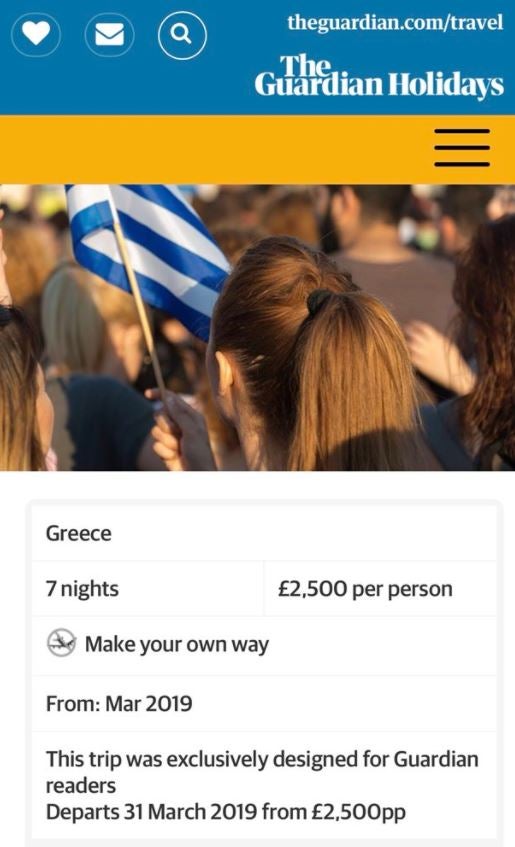
The Guardian has apologised for offering a “gross” £2,500 holiday to Athens accompanied by the paper’s own Greece correspondent Helena Smith and restated its commitment to coverage of the country.
The title yesterday removed an advert for the “Greece and The Euro” trip – which would have explored the impact of the financial and refugee crises on the country – from its online holiday listings.
The trip was labelled “crisis tourism” after it was shared on social media.
The holiday was organised through a commercial team and had no editorial involvement, Press Gazette understands. Smith had agreed to give a talk but had no further association with the project, Guardian News and Media said.
The listing was part of a trial by The Guardian with Political Tours, a travel company run by former New York Times Balkans correspondent Nicholas Wood that aims to “take people beyond the headlines”.
Guardian News and Media is no longer working with the company.
The advert said: “Join The Guardian’s Greece correspondent, Helena Smith, on this fascinating exploration of the ongoing impact of the financial and refugee crises in Greece.”
It added: “Our tour starts in the vineyards of Samos, a picturesque island just a mile from Turkey, and then moves on to the capital Athens.
“We move from remote farms to city suburbs and the nation’s parliament to gain the views of ordinary people, NGOs, businesses, and politicians along the way.
“Leading analysts and Helena will be on hand throughout and you’ll get to ask your own questions and draw your own conclusions about some of the most crucial issues affecting Europe and Greece today.”
The trip’s tour leader was to be Greek journalist Manos Stefanakis and travellers were being offered the chance to meet local families in Athens “to discover how their lives have been affected by the financial crisis”.
They could also visit the port of Piraeus to discuss the refugee crisis with a local NGO and “explore the financial crisis in microcosm through one Athens suburb and the charities and municipalities supporting people through austerity”.
The seven-night trip would have cost £2,500 per person, excluding flights, and was due to depart on 31 March 2019.

The advert also said the trip was “exclusively designed for Guardian readers” and “depending on her schedule Helena [Smith] should be able to accompany you on the full tour”.
The listing was widely criticised on Twitter as “poverty porn tourism”.
The Wall Street Journal’s Africa correspondent, Matina Stevis-Gridneff, tweeted: “The Guardian invites its readers to pay £2,500 for a financial and refugee crisis tour of Greece.
“I think that’s basically gross, emblematic of the kind of superior/out-of-touch, pseudo-left privileged ‘sensitivity’ the paper and its readers are criticised of. Outrageous.”
Anthee Carassava, who covers Greece for The Times, said: “These types of tours have been ongoing since the start of the financial crisis.
“But they are supposed to be bespoke, behind the scenes glimpses of Greece in crisis – not offensive mass exploitation of Greek misery. Well done the Guardian for pulling the plug on Political Tours.”
John Johnston, political reporter for Politics Home, said: “As if Greece hasn’t been through enough without a bunch of Guardian readers trouncing around on safari. Alternatively, save your £2.5k and go and visit Greece like a normal person and help support local businesses.”
The advert was online for a week before it was removed yesterday.
A Guardian News and Media spokesperson told Press Gazette: “We have now stopped the project and apologise for the offence caused.
“The Guardian remains committed to our independent reporting of Greece and always will be.
“Helena Smith, the Guardian’s Greece correspondent, had agreed to give a talk but had no involvement in organising, leading or promoting the trip.
“She is an accomplished and professional journalist and has reported from Greece for many years.”
Picture: Reuters/Suzanne Plunkett
Email pged@pressgazette.co.uk to point out mistakes, provide story tips or send in a letter for publication on our "Letters Page" blog

